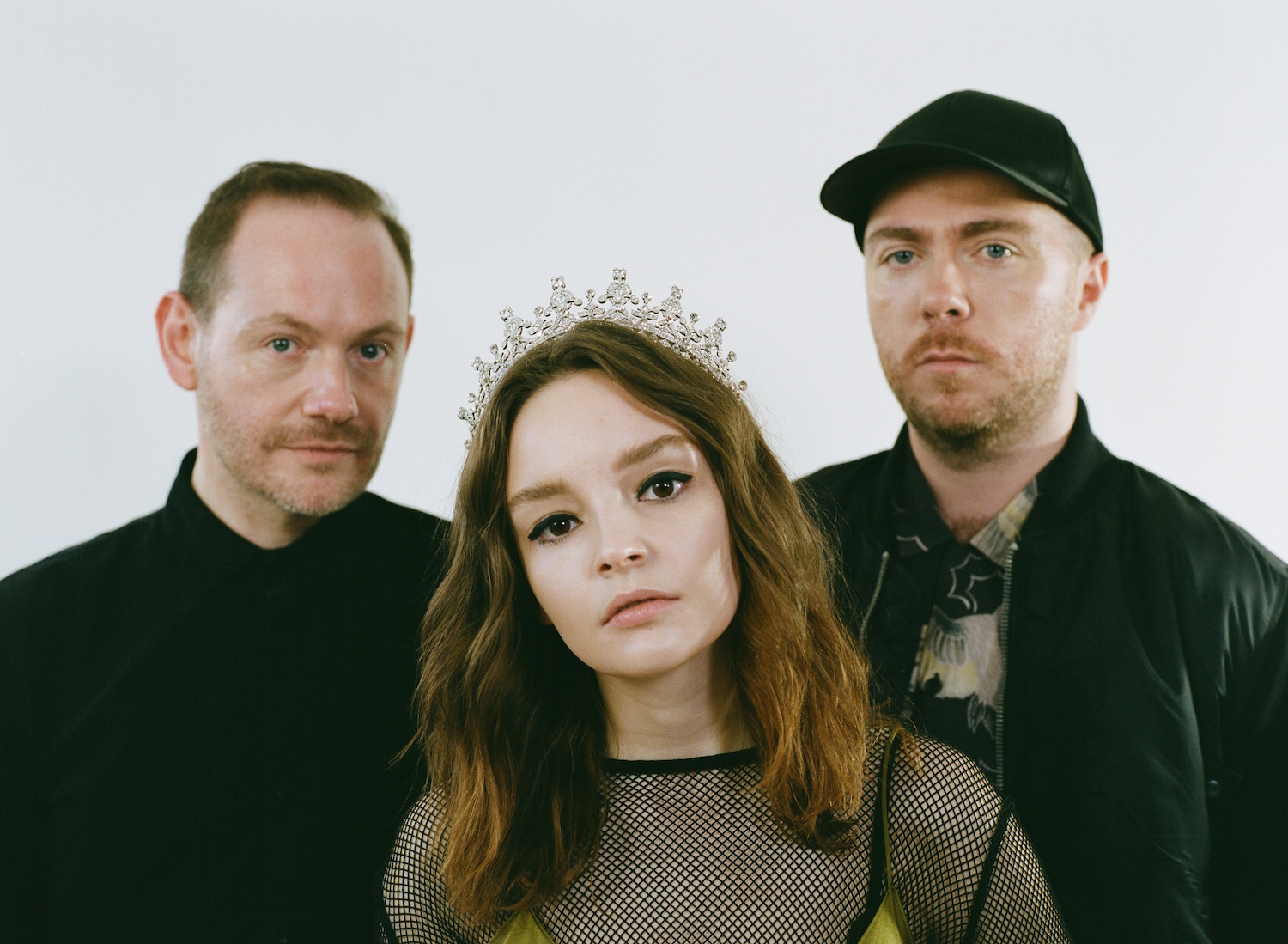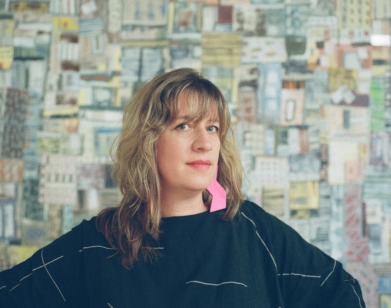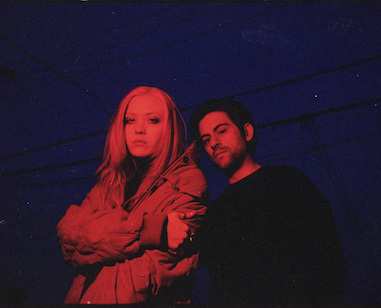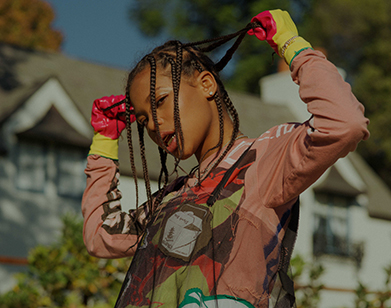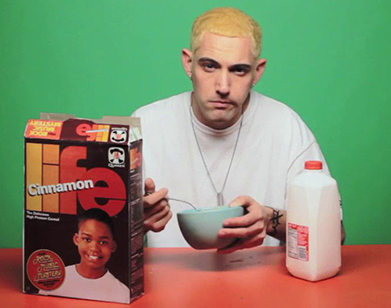Romance is alive and well in Love is Dead, Chvrches’ new album
Glaswegian trio Chvrches have few peers. Sure, they have plenty of imitators—synth-pop bands who split the difference between pop hooks and experimental textures are all over festival lineups—but none have so perfectly nailed the formula. Chvrches’ music captures electric angst with unmatched intensity.
Furthermore, lead singer Lauren Mayberry has spent the last decade leading the charge against misogyny in online spaces. In 2013, Mayberry published a searing op-ed for the Guardian about the abuse that female musicians face on the internet. “Is the casual objectification of women so commonplace,” she wrote, “that we should all just suck it up, roll over and accept defeat?”
At the time, Mayberry seemed like a lone voice in the wilderness. But over the last five years, her sentiment has become a rallying cry for a generation of feminists furious with the toxic status quo.
Now, the band are preparing to release their third album, Love Is Dead, and they haven’t softened their critical perspective one bit. “The state of the world … it’s fucked, man,” reflects multi-instrumentalist Iain Cook. For her part, Mayberry is focused on maintaining integrity and focus amid the selfishness and violence. “How do you not get overwhelmed,” she asks, “[and] just bury your head in the sand?”
This tension is evident in singles like “Never Say Die,” which balances hair-raising melodies with gravity-shifting electronics, while Mayberry’s lyrics address patterns of deceit that destabilize relationships. “Weren’t you gonna be sorry and weren’t you gonna be pure?” she snarls.
This spiky energy is part of what makes Chvrches so special. In a world of anodyne, toothless pop, they’re never afraid to go for the throat.
EZRA MARCUS: I wanted to mention that some of the songs on your new record remind me of Glaswegian producer Rustie. What’s your relationship with Glasgow’s electronic music scene?
MARTIN DOHERTY: I’m a massive Rustie fan. I don’t think we were trying to channel him directly, but I think about the amount of weight in those records; maybe there is something. I grew up on Rustie, that was everything to me when I was coming through learning electronics and music. I’ve grown up watching those guys, seeing them in The Arches and in the Art School. It’s cool that you would say that.
MARCUS: Did you guys go to a lot of clubs and raves in your youth?
DOHERTY: In my youth, yeah. That’s the thing about Glasgow. That kind of culture is everywhere. There’s the rock and punk scene, and then there’s the electronic scene, which is massive. Then there’s this little canal in the middle where both of those things meet, and that’s where you’re talking about Joakim and Numbers, which is an Edinburgh thing, really, but obviously had a big presence in Glasgow. Where those two things met is where I’ve always been; caught between both worlds. I’ve always loved that about Glasgow.
LAUREN MAYBERRY: I feel like Iain and I probably went to more shows, as opposed to clubs. Glasgow does pretty well for a city of its size. I remember seeing Killing Joke and Converge in one week in Glasgow.
COOK: There’s a pretty local scene as well. There’s so many great bands from Glasgow, you know? I think there’s always this kind of understanding between musicians that Glasgow is the most real audience. You’re gonna go there and you’re either gonna sink or swim. It’s either gonna be the best or the worst show of the tour, because people don’t take any shit.
DOHERTY: I feel like Glasgow audiences make a really pure judgment on what they’re seeing in the moment. They could love a band and still slaughter them if they’re not getting value for their money. I’ve always respected that.
MARCUS: Lauren, I was reading some of your older interviews, and I noticed reference to a zine you started when you were younger.
MAYBERRY: Tuck Your Cunt In, yeah. It started around the time we started this band, so it was kind of prophetic. It was just started as a monthly club night where you’d book female bands and DJs, and then we started the zine. I guess it was a throwback to stuff we loved in our teenage years. I remember going to a record store and buying Dig Me Out by Sleater-Kinney based on how cool the cover was, and I remember asking the guy what it was and he was like, “Yeah, you should get that, and you should also get The Singles by Bikini Kill.” I don’t know if that record shop exists anymore, it was called Second Sound.
DOHERTY: We all come from local towns outside of Glasgow, just between Glasgow and Edinburgh, and everyone had their record shop.
COOK: It’ll never be like that again though. There isn’t that sense of community in the way that there used to be.
MAYBERRY: I feel lucky that all three of us come from a similar place in terms of the music we used to make and the way we grew up being in bands. I feel like it’s nice to hold onto aspects of that ethos and that mentality and then apply that to a pop music context, because we fall between the lines of it. We’re not necessarily super alternative, but we’re not super pop.
DOHERTY: It’s interesting being in a band in this time for that reason, like bridging the gap between those two worlds. I read just yesterday that [guitar manufacturer] Gibson are on the edge of bankruptcy. It struck me then that like, that’s the death of the band, you know what I mean? The death of VHS is when people stopped making VHS players for example. The death of the rock band is when people stop fucking making guitars because there’s not enough demand. I thought it was actually quite tragic. When I read that I was like, “Fuck, this is it. This is happening.”
MAYBERRY: There’s still good guitar bands but I guess because alternative radio’s had to change and adapt so much it’s harder for certain kinds of guitar bands to get on entry level alternative radio. But then, I don’t know. We were talking about Car Seat Headrest the other day and they’re one of the best guitar bands right now. And we were talking about Big Thief, and Hop Along. Two of my faves.
DOHERTY: See this is the funniest thing. We’re having this conversation but to me, as someone who didn’t listen to a note of guitar music for maybe five or six years, in the last two years, there’s been an enormous resurgence in indie.
MAYBERRY: Maybe things just went so far the other way that they’re gonna swing back.
COOK: I mean, we did use the term today when talking about a band, post-genre. Which is interesting, because I feel like back in the day bands like us that exist between two worlds would often fall between the cracks. Maybe that’s not quite our fate.
MAYBERRY: Yeah, even since we started the band I feel like it’s changed a bit. People didn’t know what to do with it. In 2012 they were like, “Okay, are [Chvrches] an alternative band or are they a Top 40 band?” And then we got attention because of the internet and because of streaming. So as much as people complain about the negative aspects of streaming, I feel like in another way it’s broken down the barriers of what genre is and what you’re supposed to do within those genres. And I think that’s pretty cool.
DOHERTY: There’s always been to me like two sides to this band, two really clear sides, and this record was about trying to sharpen each aspect if you know what I mean, rather than put it all in one jumble.
Not that I’m comparing myself to this band, but The Cure [are a band] that I’ve always considered to be at the highest level of craftsmanship and creativity. They are the kind of band that can do multiple things on one album, and appeal to enough people that they can have a career. And not just for the sake of trying to release a Britney Spears record here and a Mogwai record there.
MAYBERRY: Don’t say anything mean about Britney. At this point I’m like, everyone just protect Britney and be nice to her.
DOHERTY: Leave Britney alone!
MAYBERRY: Leave her alone! Has she not suffered enough for your American dream?
MARCUS: There was one quote that really stood out to me from your guys’ press release, about how on this record, you tried to write less about romantic love specifically and more about the overarching concept of love. I was hoping you could elaborate.
MAYBERRY: There’s definitely still songs on the record that are about those relationships, but a lot of the stuff that makes me the saddest in the world now doesn’t necessarily have to do with the romantic part of my life anymore. When you’re growing up you’re thinking about that so much and you’re obsessed with it; it’s still part of my life but, the things that make me sad about romantic relationships exist in other relationships too. I accidentally made myself cry the other day when I was talking about something in the news, and I was like, “Fuck, man, everyone’s so selfish,” and then I cried in the middle of a cafe. [laughs] I was just like, “What’s wrong with me?”
Why are things the way they are, why are we the way we are with our families and friends? Those things are a micro version of how we are to everyone else in the world. As much I think it’s important to get angry about things that are important, I also think that there’s more strength sometimes in showing kindness.
MARCUS: Is this idea of a breakdown of love and empathy something that you’ve noticed more recently, or have you been thinking about it for a long time?
MAYBERRY: I’ve become more conscious of it in the last few years. But maybe that’s just because I approached the big 3-0. There’s so much strength and resilience, but there’s so much selfishness in how we treat each other. How do you weigh out those two things personally? I don’t know.
MARCUS: You have been speaking out against chauvinistic behavior, especially with regard to online spaces, for a long time. Now that these conversations have become more common, what lessons do you have for us about combatting reactionary mindsets within the music world and beyond?
MAYBERRY: A lot of that behavior I find generally fucking infuriating. I don’t think I’m an angry person but some of those things make me really fucking angry. But I’ve come to terms with the fact that standing and screaming in someone’s face about how wrong they are is never gonna make anyone change. When people say stuff to us casually in reviews, if they write about it in a condescending way with really gendered language, that’s not really about me. It used to hurt my feelings more than it does now. That’s not about us as a band or me as a person, that’s about how you feel about women, and that’s a societal thing. When people say stuff like that, that’s a domination thing; you feel sad about what’s happening in your life and the state of the world.
MARCUS: I feel like you being outspoken about this issue has helped a lot of people, including me, realize the extent to which the world of so-called progressive indie rock contains a shocking amount of…
MAYBERRY: Creeps? Yeah [laughs]. I read Jessica Hopper’s piece about the entrenched misogyny of emo, and I was like, “What?” I grew up listening to emo and I was like, “Oh no, that didn’t happen.” And I sat there looking at brand new lyrics and Glassjaw lyrics like, “Oh yeah.” I paraphrase badly but she wrote something about how girls were essential to the rise of emo because they were the ones behind it and they were the ones these songs were getting written about, but emo wasn’t for us, you know? There weren’t women in emo bands. That’s why Paramore was so important. [Hayley Williams] is an incredible vocalist but like, there isn’t really a lot of bands in that space that had women in those positions and it was weird to look at them and be like, oh you’ve internalized that kind of misogyny and you take part in it because that’s just how you’ve been trained to think.
MARCUS: I have one last question.
MAYBERRY: Where does the V come from?
ALL: [laughs] No!
MARCUS: Will you ever replace your pet hamster that died?
BOTH: Awww.
MAYBERRY: My dead hamster. At the moment I have no plans to. He lived a long, healthy life for a hamster.
DOHERTY: Yeah, that was a bougiest fucking hamster that ever lived.
MAYBERRY: He had a multi-layered mansion.
MARCUS: What else could a hamster want?
MAYBERRY: Maybe I’m just a melancholic person, but I was like, “People buy these pets for their kids to teach them about death and nature.” And then as soon as I got him, I was like, “Oh fuck, he’s gonna die! He’s gonna die one day!” I couldn’t even enjoy it because I was so worried about him dying [laughs].
DOHERTY: I won’t buy a dog for that reason. I’d just be like, buying pain. [laughs] I don’t wanna buy pain.
MAYBERRY: Once the hamster got stuck. He burrowed into the edge of the couch when we were hanging out—you know like, hanging with a hamster—and he got trapped inside it for like three and a half hours. It was terrible. I could hear him screeching, and in that moment I was like, “Oh my god, he’s gonna die inside of my couch!” And then he lived for like two years after that. He was an old hamster.

